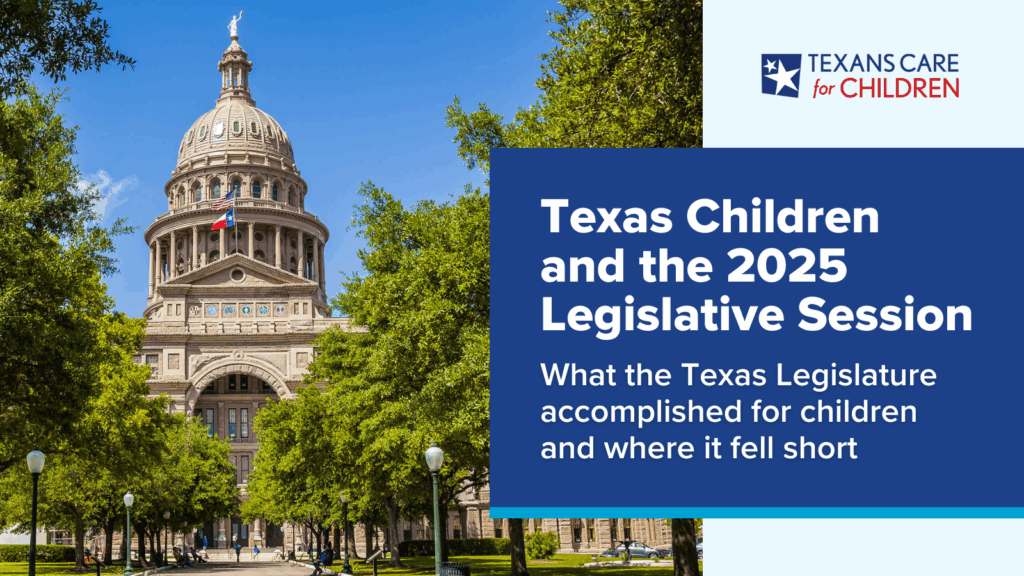
I’m pleased to release our new report looking back on key children’s issues of the 2025 Texas legislative session and looking forward to our next steps. This report builds on the preliminary report we published on the last day of the session.
As children’s advocates look back on the 2025 legislative session, we have a lot to celebrate, a number of disappointments, and plenty of unfinished business that will require our focus and dedication during the months ahead.
We’re excited about some of the steps state lawmakers took to support children, particularly through the financial investments they made. They made a historic $100 million commitment to child care scholarships, giving thousands of low-income parents an opportunity to go to work or school while their children attend a high-quality child care program. Legislators passed a badly-needed $8.5 billion public school funding bill. Additionally, the Legislature invested in overhauling outdated technology in the state’s application system for SNAP nutrition assistance and Medicaid health insurance; improved funding for mobile youth crisis teams and other children’s mental health services; and, for the first time, devoted state funding to continue the Texas Family First pilot program to keep kids safely out of foster care.
Legislators also passed a suite of bills to support older youth in foster care, legislation to improve support for breastfeeding, a bill for newborn babies’ health coverage, and key child care proposals, including legislation to boost access to child care for child care educators.
Other important initiatives passed the House but came up short in the Senate, including proposals to extend pre-k eligibility to kids with disabilities, establish a Medicaid pilot program to cover doula services, and notify parents if their SNAP applications show their children are also eligible for Medicaid health insurance. While these bills did not win final approval, we are gratified that they passed the House and hopeful we can take that momentum into the next legislative session.
In addition to these disappointments, we’re concerned that some bills that did pass, such as pre-k legislation, will pose new challenges for families or the providers who serve them.
These successes and disappointments, as well as many others, are explained in greater detail in the following pages.
The results of the session are a mixed bag for Texas kids and families, but I am so grateful to our staff, our partners, and the Texas families who shared their stories with legislators. Working together, we helped pass legislation, build momentum for policies we can get over the finish line next session, influence bills through committee testimony and one-on-one conversations, and, in a few cases, keep potentially harmful policy ideas from moving forward. We’re also thankful to the lawmakers and staffers who worked tirelessly throughout the legislative session and championed good bills in bipartisan ways.
As we catch our breath after the session, we are already pivoting to the next steps. There’s no time to lose. While the Legislature may fade from the headlines until the next session in 2027, we know the challenges facing Texas families won’t fade away for two years. During the interim, the opportunities to improve children’s lives may not get as much attention as a major vote in the Legislature, but there’s critical work for us to do outside of the spotlight.
So in the coming weeks and months, our team will keep fighting for Texas kids by shaping the implementation of bills that passed, building on the momentum from this session, and developing fresh ideas as we collaborate with our partners and listen to Texas families. We will also continue to oppose the disturbing Medicaid and SNAP cuts that Congress is considering.
We invite you to learn more at our July 8th briefing about the legislative session and our next steps:
You can also read or download the individual issue sections:
We appreciate your partnership on this difficult journey to ensure that Texas children from every zip code thrive and reach their full potential.



